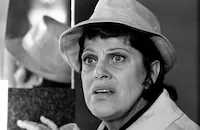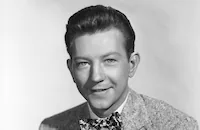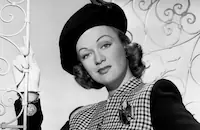Donald O'Connor, the sprightly, acrobatic dancer-comedian who was unforgettable in his exhilarating "Make 'em Laugh" number in the classic musical Singin' in the Rain, died of heart failure at the Motion Picture Country Home and Hospital in Woodland Hills, California on September 27. He was 78.
Born Donald David Dixon O' Connor in Chicago on August 28, 1925, he was raised in an atmosphere of show business. His parents were circus trapeze artists and later vaudeville entertainers, and as soon as young Donald was old enough to walk, he was performing in a variety of dance and stunt routines all across the country. Discovered by a film scout at age 11, he made his film debut with two of his brothers in Melody for Two (1937), and was singled out for a contract by Paramount Pictures. He co-starred with Bing Crosby and Fred MacMurray in Sing, You Sinners (1938) and played juvenile roles in several films, including Huckleberry Finn in Tom Sawyer - Detective (1938) and the title character as a child in Beau Geste (1939).
As O'Connor grew into adolescence, he fared pretty well as a youthful hoofer, dancing up a storm in a string of low-budget, but engaging musicals for Universal Studios (often teamed with the equally vigorous Peggy Ryan) during World War II. Titles like What's Cookin', Get Hep to Love (both 1942), Chip Off the Old Block and Strictly in the Groove (both 1943) made for some fairly innocuous entertainment, but they went a long way in displaying O'Connor's athletic dancing and boyish charm. As an adult, O'Connor struck paydirt again when he starred opposite a talking mule (with a voice supplied by Chill Wills) in the enormously popular Francis (1949). The story about an Army private who discovers that only he can communicate with a talking army mule, proved to be a very profitable hit with kids, and Universal went on to star him in several sequels.
Yet if O'Connor had to stake his claim to cinematic greatness, it would unquestionably be his daringly acrobatic, brazenly funny turn as Cosmo Brown, Gene Kelly's sidekick in the brilliant Singin' in the Rain (1952). Although his self-choreographed routine of "Make "Em Laugh" (which includes a mind-bending series of backflips off the walls) is often singled out as the highlight, in truth, his whole performance is one of the highlights of the film. His deft comic delivery of one-liners, crazy facial expressions (just watch him lampoon the diction teacher in the glorious "Moses Supposes" bit) and exhilarating dance moves (the opening "Fit As a Fiddle" number with Kelly to name just one) throughout the film are just sheer film treats in any critic's book.
After the success of Singin' in the Rain, O'Connor proved that he had enough charisma to command his first starring vehicle, opposite Debbie Reynolds, in the cute musical I Love Melvin (1953). He also found good parts in Call Me Madam (1953), There's No Business Like Show Business (1954), and Anything Goes (1956). Unfortunately, his one attempt at a strong dramatic role, the lead in the weak biopic The Buster Keaton Story (1957) proved to be misstep, and he was panned by the critics.
By the '60s, the popularity of musicals had faded, and O'Connor spent the next several years supporting himself with many dinner theater and nightclub appearances; but just when it looked like we wouldn't see O'Connor's talent shine again on the small or big screen, he found himself in demand at the dawn of the '90s in a string of TV appearances: Murder She Wrote, Tales From the Crypt, Fraser, The Nanny; and movies: Robin Williams' toy-manufacturer father in Toys (1992), a fellow passenger in the Lemmon-Matthau comedy, Out to Sea (1997), that were as welcoming as they were heartening. Survivors include his wife, Gloria; four children, Alicia, Donna, Fred and Kevin; and four grandchildren.
by Michael T. Toole
Pandemonium
Brief Synopsis
A mad killer haunts the campus of it Had To Be U, a school for cheerleaders, murdering the students in various silly ways.
Cast & Crew
Read More
Alfred Sole
Director
Tom Smothers
Carol Kane
Debralee Scott
Miles Chapin
Candice Azzara
Film Details
Also Known As
Thursday the 12th
MPAA Rating
Genre
Comedy
Horror
Release Date
1982
Technical Specs
Duration
1h 21m
Synopsis
A mad killer haunts the campus of it Had To Be U, a school for cheerleaders, murdering the students in various silly ways.
Cast
Tom Smothers

Carol Kane
Debralee Scott
Miles Chapin
Candice Azzara
Pat Ast

Paul Reubens
Edie Mcclurg
Marc Mcclure

Tab Hunter

Kaye Ballard
Candi Brough
John Paragon
Gary Allen
Teri Landrum
David Lander

Richard Romanus
Sydney Lassick

Donald O'connor
Judge Reinhold
Izabella Telezynska
Don Mcleod
Randi Brough
Jim Mckrell

Eve Arden
Eileen Brennan
Lenny Montana
Crew
Doug Chapin
Producer
James Claytor
Art Director
Jack Deshields
Production Designer
Charles Graffeo
Set Decorator
Michel Hugo
Director Of Photography
Michel Hugo
Other
Eric Jenkins
Editor
Dana Kaproff
Music
Jaime Klein
Screenplay
James Klein
Associate Producer
Barry Krost
Executive Producer
Ed Milkovich
Assistant Director
Bill Watkins
Production Manager
Keith Wester
Sound
Richard Whitley
Screenplay
Richard Whitley
Associate Producer
Film Details
Also Known As
Thursday the 12th
MPAA Rating
Genre
Comedy
Horror
Release Date
1982
Technical Specs
Duration
1h 21m
Articles
Donald O'Connor, 1925-2003

Donald O'Connor, 1925-2003
Donald O'Connor, the sprightly, acrobatic dancer-comedian who was unforgettable in his exhilarating "Make 'em Laugh" number in the classic musical Singin' in the Rain, died of heart failure at the Motion Picture Country Home and Hospital in Woodland Hills, California on September 27. He was 78.
Born Donald David Dixon O' Connor in Chicago on August 28, 1925, he was raised in an atmosphere of show business. His parents were circus trapeze artists and later vaudeville entertainers, and as soon as young Donald was old enough to walk, he was performing in a variety of dance and stunt routines all across the country. Discovered by a film scout at age 11, he made his film debut with two of his brothers in Melody for Two (1937), and was singled out for a contract by Paramount Pictures. He co-starred with Bing Crosby and Fred MacMurray in Sing, You Sinners (1938) and played juvenile roles in several films, including Huckleberry Finn in Tom Sawyer - Detective (1938) and the title character as a child in Beau Geste (1939).
As O'Connor grew into adolescence, he fared pretty well as a youthful hoofer, dancing up a storm in a string of low-budget, but engaging musicals for Universal Studios (often teamed with the equally vigorous Peggy Ryan) during World War II. Titles like What's Cookin', Get Hep to Love (both 1942), Chip Off the Old Block and Strictly in the Groove (both 1943) made for some fairly innocuous entertainment, but they went a long way in displaying O'Connor's athletic dancing and boyish charm. As an adult, O'Connor struck paydirt again when he starred opposite a talking mule (with a voice supplied by Chill Wills) in the enormously popular Francis (1949). The story about an Army private who discovers that only he can communicate with a talking army mule, proved to be a very profitable hit with kids, and Universal went on to star him in several sequels.
Yet if O'Connor had to stake his claim to cinematic greatness, it would unquestionably be his daringly acrobatic, brazenly funny turn as Cosmo Brown, Gene Kelly's sidekick in the brilliant Singin' in the Rain (1952). Although his self-choreographed routine of "Make "Em Laugh" (which includes a mind-bending series of backflips off the walls) is often singled out as the highlight, in truth, his whole performance is one of the highlights of the film. His deft comic delivery of one-liners, crazy facial expressions (just watch him lampoon the diction teacher in the glorious "Moses Supposes" bit) and exhilarating dance moves (the opening "Fit As a Fiddle" number with Kelly to name just one) throughout the film are just sheer film treats in any critic's book.
After the success of Singin' in the Rain, O'Connor proved that he had enough charisma to command his first starring vehicle, opposite Debbie Reynolds, in the cute musical I Love Melvin (1953). He also found good parts in Call Me Madam (1953), There's No Business Like Show Business (1954), and Anything Goes (1956). Unfortunately, his one attempt at a strong dramatic role, the lead in the weak biopic The Buster Keaton Story (1957) proved to be misstep, and he was panned by the critics.
By the '60s, the popularity of musicals had faded, and O'Connor spent the next several years supporting himself with many dinner theater and nightclub appearances; but just when it looked like we wouldn't see O'Connor's talent shine again on the small or big screen, he found himself in demand at the dawn of the '90s in a string of TV appearances: Murder She Wrote, Tales From the Crypt, Fraser, The Nanny; and movies: Robin Williams' toy-manufacturer father in Toys (1992), a fellow passenger in the Lemmon-Matthau comedy, Out to Sea (1997), that were as welcoming as they were heartening. Survivors include his wife, Gloria; four children, Alicia, Donna, Fred and Kevin; and four grandchildren.
by Michael T. Toole
Quotes
Trivia
Miscellaneous Notes
Released in United States Winter January 1, 1982
Released in United States on Video February 1987
Test bookings under original title "Thursday the 12th" in 1982.
Released in United States Winter January 1, 1982
Released in United States on Video February 1987













